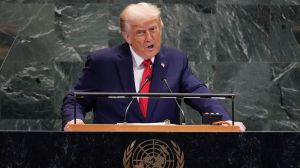Focus on Pak as US traces sale of n-tech
American law enforcement officials said on Friday they were trying to determine if the Pakistan was involved in a plot by a South African bu...

American law enforcement officials said on Friday they were trying to determine if the Pakistan was involved in a plot by a South African businessman to export trigger devices that could be used for nuclear arms. ‘‘That’s one possibility we’re investigating,’’ said an official. ‘‘We know these devices went to Pakistan. What we’re investigating is where they ended up and who was behind it.’’
Asher Karni, an Israeli who lives in South Africa, was arrested in Denver this month on charges that he had illegally exported the devices to Pakistan. In court documents, US authorities charged that Karni, 50, was at the centre of an operation that used front companies and false billing records to route the devices from a private manufacturer in Salem to South Africa, UAE and then Pakistan.
The devices, high-speed electrical switches called Triggered Spark Gaps, are used in hospitals for kidney stone operations, albeit in a short quantity — not the 200 that Karni is accused of ordering from a US supplier, Perkin Elmer Optoelectronics, of Salem. A Pakistan diplomat in Washington said Pakistan would cooperate in the probe. ‘‘We are not involved in any proliferation activity,’’ said a Pakistani official.
But US officials said they had come to focus on the possibility that the Pakistani government was involved for several reasons, beginning with the large number of devices Karni ordered. Further, a Pakistani businessman named Humayun Khan who received the devices had ties to the Pakistani military and appears to have been involved in jet fighter production. Federal prosecutors said, ‘‘Karni has exported goods that are capable of detonating nuclear arms to a person he knows has ties to the Pakistani military.’’
The government’s filing said: ‘‘Although Pakistan’s current leadership has vowed to curb the spread of this technology, that region of the world remains volatile, and Islamic militants in the area have made no secret of their desire for nuclear arms.’’
The government’s probe appears to have begun last summer, when investigators with the Commerce Department and the Bureau of Immigration and Customs Enforcement received information about the possible diversion of US equipment to the sub-continent, according to court papers. In an affidavit filed in the case, James R. Brigham, an agent with the Commerce Department, said Karni tried to buy 400 of the devices.
Investigators learned that Karni, working through a New Jersey contact, placed an order last year with PerkinElmer for 200 triggers at a cost of $89,400, Brigham said. Working with government officials, the company agreed to disable the first shipment of 66 triggers by closing off the gas in-take lines, the government’s affidavit said. But officials said it was not known if Karni had succeeded in exporting any other working triggers to Pakistan.
Earlier, Karni tried to buy triggers in France and have them sent directly to Pakistan, officials said. But that effort failed when the sales agent told him that he would have to get a US export license.
Photos



- 01
- 02
- 03
- 04
- 05




























